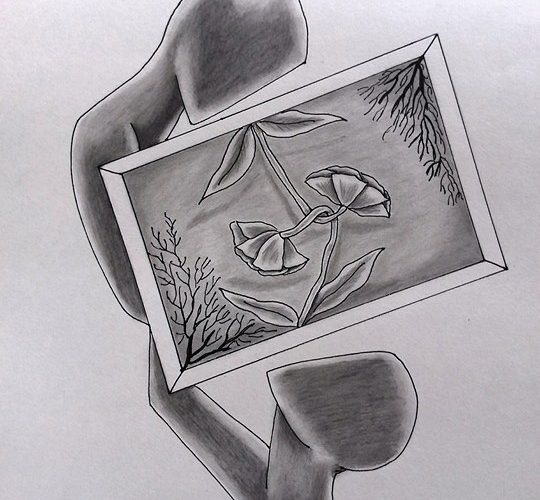The famous Tyagaraja Kriti, “endaro mahanubhaavulu…” in the legendary voice of M. S. Subbulakshmi was playing on the stereo. Her bifocal spectacles lay on the notebook bookmarked with an uncapped red pen beside her on the rear seat of the car. And the book that she was then reading, “My name is Lucy Barton” lay in an inverted V, covering her face.
The Sare Jahan se Acha instrumental on the Nokia 1100 jolted her out of the sleep. As the book dropped to her lap in a flash, she struggled to identify the unknown number flashing on her phone screen. Hesitantly, she answered the call. Before the traditional pleasantries could end or the introduction could start from the caller on the other end, her lips widened, her eye lashes gently dropped into thoughtfulness, her forehead creased and almost immediately relaxed, her eyes opened with a sparkle as her cheek bones lifted into her trademark smile. “Shaaahhiidddd???”
June, 1990
My first memory of her was of her standing tall (way taller than the then me) in the middle of running noses, stacks of papers – on and off the books, screaming noises and thousand questions a day. That was my first day at school and so was hers in our class.
The then NCERT English textbooks had only four characters – Mr. & Mrs. Lal and their children Gappu and Gauri – running through all the chapters gradually moving from simple sentences to complex concepts in the language. As we learnt the basic sentence structures, nouns, pronouns and adjectives with Gappu and Gauri, I completed my sixth grade proudly able to articulate Mrs. S is my favourite teacher.
Who as kids wouldn’t like stories and wouldn’t like the ones who teach us these stories. Be it grandparents at home, or the language teachers at school. Little did I know then, of the influence they were going to be in the years to come.
January 1994
It was a cold winter morning, and Mrs. S’s was the first hour. She had asked the students to be ready with the assigned homework submissions and she was going through the count of the notebooks submitted. Famous though she was for her softness and emotional touch while teaching a lesson, her sternness and punishments to insincerity had a terror striking repute.
I was never at any risk in her class, for I did everything to the T. But something that day in the class was amiss. One of the few voices mostly heard while answering questions was not heard. Seeing the owner of the voice, Mrs. S’s daughter returning to the class after kneeling down outside as a punishment for not doing the homework, taught me an important lesson that day.
For Mrs. S, all the students were like her kids beyond the classroom, and her own daughter like any other kid while teaching. She was indeed a woman of her words.
That was the day she started teaching me lessons outside the textbook too.
December 1996
All these years being in a boarding school, the bonds built meant much more. The most crucial – shaping years of life, I had spent away from home, with friends who became the family and teachers who would not only mentor but also parent us. Of course, the best of all of this was that I had the good fortune of spending time with my favourite Mrs. S beyond the class hours and discuss anything and everything.
This was yet another day, where I was debating with her on one of the poems by Keats, sitting on the ramp of her tiny house inside the school campus. Walking back that evening I just sneaked into the yester years. From the teacherly times of Mrs. S, when she would take us through stories – a Scientist’s Journey to the end of the earth, a vagabond selling The Rattrap as a metaphor to his perception of the world, The Enemy which talks of the moral dilemma of a Japanese doctor who finds an injured American Prisoner of War at his doorstep, On the Face of It where an old man strikes an unusual friendship with a withdrawn and defiant boy -, to the times beyond the classroom when she would talk to us with the affection and warmth of a mother, I hardly realised when I finished half my teen years, when from a boy I started thinking like an adult, when the stories we were taught turned into life lessons.
February 1997
I am a twelfth grader now. Ironically, my last few months at school. Today is the last day of instruction. This would be The Last Lesson Mrs. S would be teaching us. I felt like Johnsy in O. Henry’s The Last Leaf. I wondered if at all I would be able to concentrate on the lecture, but I had to; Mrs. S has saved this for the last day of instruction.
As she readied to read from the brown diary she always carried, the whole class was set in rapt attention.
“… You’re the bows, from which your children as living arrows are sent forth,
The archer sees the mark upon the path of the infinite,
And He bends you with his might that His arrows may go swift and far
Let your bending in the archer’s hand be for gladness
For even as he loves the arrow that flies,
So He loves also the bow that is stable”
She finished. There was an eerie silence. Not the sigh of a breath. She gently placed the diary on the teacher’s table, looked straight into our eyes and smiled. The entire class was awestruck as if enchanted by a magician’s wand, and that was how the last lesson ended.
“What a beautiful way to talk of the transience of everything in life, and of life itself yet at the same time emphasize on preparedness for the variety it brings and the places it takes us,” I thought to myself, but then I had a lingering question, that I saved for the last day of school.
April 1997
This was the first time, completing the last examination seemed like a curse. For, I was an outgoing student. With a heavy heart, I packed heavy bags, trying to carry home all the memories I could. What seemed like entering a prison seven years ago seemed like leaving home, today.
I knew parting from Mrs. S would be as difficult as a bride parting her maternal home on her wedding day – An excitement of a new life ahead, but the pain of leaving behind what made her what she is. I knocked on Mrs. S’s door. She was at her best, like she always was – graceful, majestic, eyes full of love, heart full of warmth. The physical distance to ensue had already started; we were on two different sides of the table.
“So, Shahid? All the best then. I’m sure you’ll scale great heights”. With every word she uttered her vocal muscles strained and relaxed in sync with her intonation, just like they do when she teaches in the class with absolute involvement and enjoying every word she teaches. Just that someone else will be her audience starting the next term.
“Mam, I have a question! The poem on the last day of instruction that you read out to us, On the Children by Khalil Gibran, did you read that for us or for your yourself, ma’am?”
“You’ve always been a smart kid, Shahid. Reflect upon it, you’ll understand”. I placed a neatly wrapped packet at her desk. She blessed me. That was the last time I saw her.
It was impossible not to think of her today, 5th September, 2017, not just when India celebrates Teacher’s Day, but also that in the next few hours I will be conferred the Doctorate of Philosophy for my research work on Transformative Teaching and Learning Practices.
I dialled a number I had by heart all these years, but never once dialled. I wanted to test my luck. The same familiar voice, only with a tinge of ageing, answered it. How very strange, (or predictable?), that the same person who has talked of transience has not changed her telephone number in 2 decades.
“Am I speaking to Mrs. S…? This is …” and I was cut short.
“Shaaahhiidddd..???” Despite the stretch and reluctance, I felt like the 13 year old me, being called out in the English Class.
“Ma’am, how could you recognise my voice after so many years?”
“Just the way I can distinctly remember the handwriting of hundreds of children over decades”.
“Well Shahid, I am visiting someone for an important ceremony and I am almost there. Mind, if I call you back in a while?”
“Not at all Madam, It’s a pleasure to hear you”
As I put on the blazer and locked my chambers to reach the venue of convocation, I am met by familiar eyes stepping out of the car. It would be an understatement to say that the sand was slipping away from under my feet.
But for the age and faintly wrinkled skin, she was just the same. Round spectacles, Big Red Bindi, oiled hair braided into a bun with strands of white here and there, neatly ironed cotton sari without a crease, stiff at the shoulders, just like years ago. As I walked towards her, hardly able to believe who was in front of me, at the same time grinning ear to ear like a school kid, she raised her eyes in pride to look at me. No wonder, the faith was reinforced that eyes are the window to the heart.
“Ma’am, I cannot believe that you’re here, that too today”
“Well, it only means that your friends are good at giving surprises”.
As I received my Ph.D. and finished the student address with On the Children, I noticed Mrs. S clap for me from the audience. There was my teacher clapping for me, also clapping were the young students whom I would be teaching starting tomorrow.
I understood she came to give me an answer. ‘We are all. We are the Archers, we, the bows and we, are the arrows. The last day of instruction indeed, was for both of us’.
As I walked her to my home, I noticed Mrs. S was carrying the same bag I gifted her on the last day of school, A jute handbag with an inscription in red, “If you can read this, thank a teacher”.
All I could do was, smile through happy tears, for having one and for being one.
Painting: Satya Sufi









Very interestingly written. Keep writing.